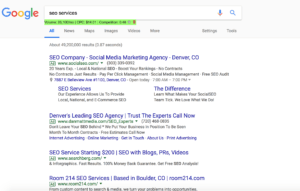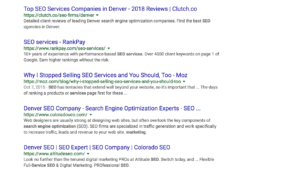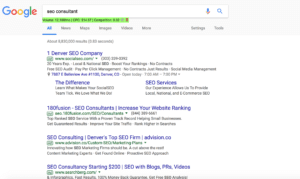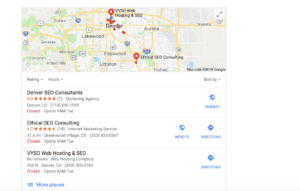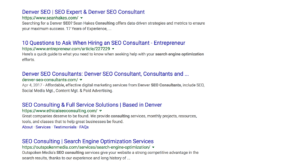Generic SEO services are dead. If you sell generic “SEO services” as well as “web design services”, “social media services”, and other generic terms that say nothing about what you actually do, then you will soon be out of business. Or, you will continue the client churn and burn with high acquisition costs for low budget clients who want to pay nothing and get everything.
And this is your own fault because of how you have positioned yourself.
Before I go any further, let me reiterate that I am not saying that SEO is dead. SEO is very alive and well. I am trying to push our industry further and encourage all of you to think more strategically about how you position yourself, talk about your offerings, and sell work to clients. Everyone will be better off for it, I believe, if we start talking about our work in terms of business impact instead of a thing we deliver that is an expense on a P&L.
So please, do not leave a comment asking why I said SEO is dead and that you should learn SEO. If you want to leave that comment, go back and re-read the post.
Last week I posted a LinkedIn update that said this:
SEO services are dead.
Yeah, I said it and I mean it.
I’m not saying SEO itself is dead.
It’s very much alive and growing, contrary to what all the detractors say.
But the old idea of “SEO services” as something a business purchases as a package to “improve Google rankings” needs to die.
It doesn’t work, and it hasn’t for a long time.
9 years ago when I got into this crazy SEO world, it was much easier to rank than it is now.
Buy some links, pay someone overseas to write 200 characters of crappy “SEO content”, throw it on a page, buy some more links, and boom, rankings.
But things have changed immensely over the last 9 years and so our strategies need to change.
If an agency is selling you “SEO services” and not explaining to you what they are doing and how they do it and who they’ve done it for before and the results they achieved, then you shouldn’t hire them.
Would you let someone do PR for your company without oversight into the messaging, branding, and places you’re trying to get coverage?
Then why let someone control your content, your links, AND the analytics that show the results of their work?
Don’t buy “SEO services”.
Learn some SEO yourself, learn your opportunity, and then find an agency that complements the skillsets and teams you already have.
I resolved a long time ago that I would not be the person to declare something “dead”, but here we are.
For too long, the SEO industry has lived somewhere between the realm of black magic and spammers. We’ve all received these emails:
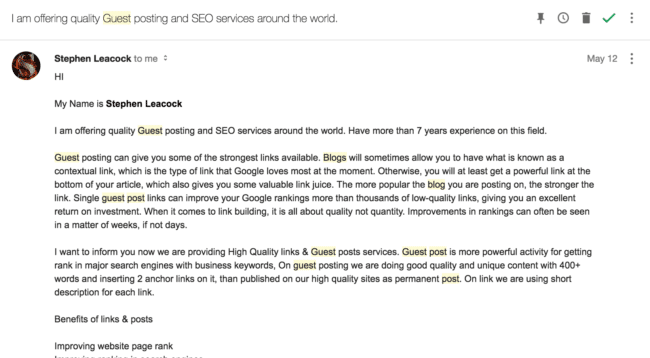
And dealt with situations like these:
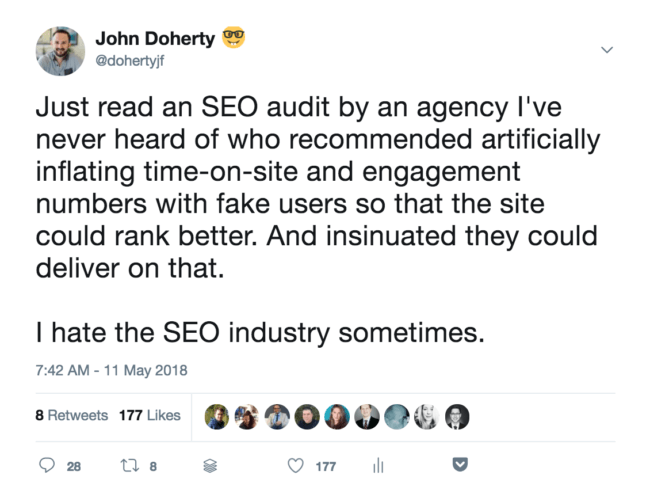
And if you are an SEO professional, you’ve felt this frustration:
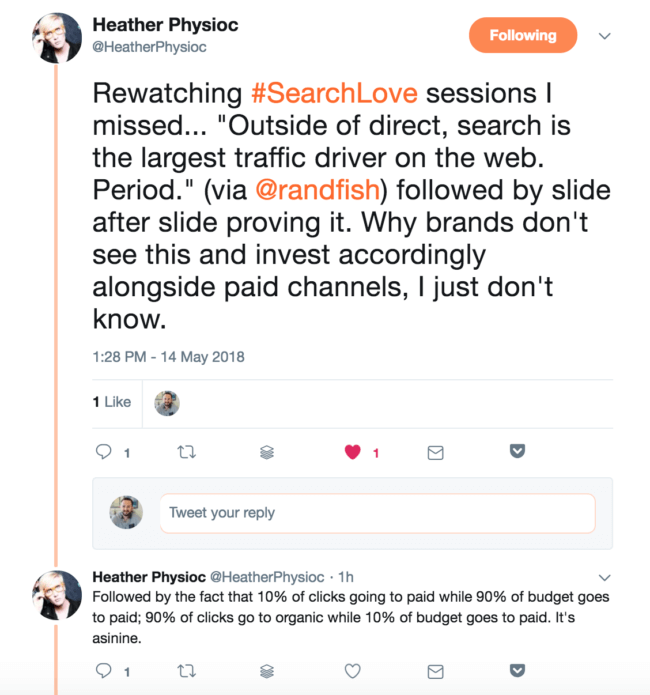
Table of Contents
Death to SEO services
If you start doing research into SEO companies online, it’s hard to get beyond the surface.
So many companies offer things like “SEO services” and talk about them like these people selling their goods for $5:
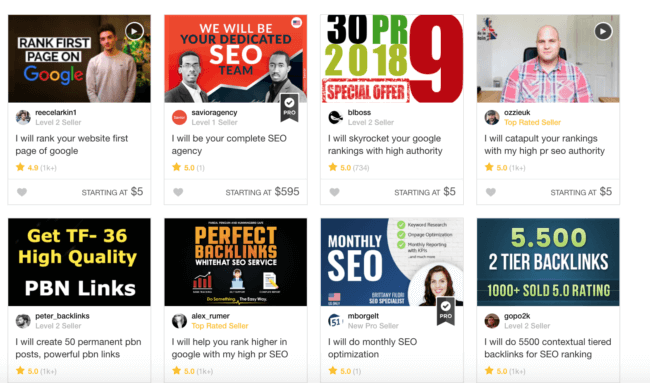
No wonder we’re not taken seriously or given big budgets.
We’re talking about “rankings”, “backlinks”, and “high pr seo authority”.
SEO services are an expense. An expense is something that goes on the balance sheet and can be cut to improve profitability.
If you’re selling SEO services as a product, as an expense, and a cheap expense at that then you should expect to struggle in building a business because you are not selling your clients what they actually want – a bigger and more profitable business.
Moving from expense > investment
If you own any stocks, then you know that they are meant to grow over time. If you bought $1,000 of Facebook stock at its bottom on August 31, 2012 at the price of $18.06, guess how much money you’d have now.
Approximately $10,000.
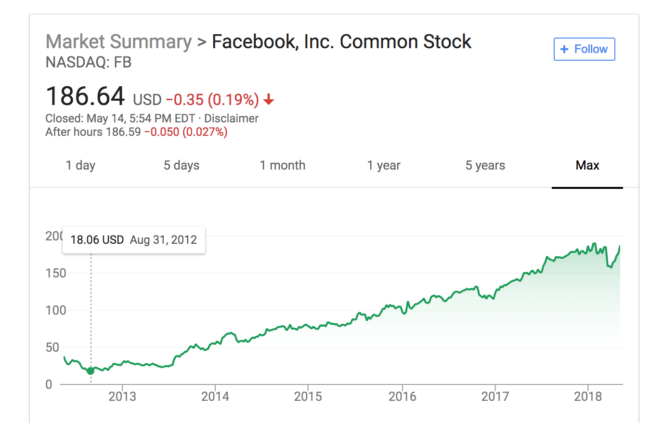
An expense is something that you pay and never expect to recoup the cost. Often, it’s something that you begrudgingly pay for because you’re forced to.
Think about getting new tires on your car. No one enjoys paying $700 for new tires even though you know that they will keep you safe. They feel like an expense and the experience is horrible, so you put it off.
This happens with businesses every day too. They take a look at something that they “know [they] should prioritize”, but then they don’t because they are not sure what they are getting.
This happens with SEO every day. You speak with a potential client about their SEO (or traffic or revenue) needs and put in the time to understand their business. Then you send them a proposal for your services and position it as the start to a conversation, but then you never hear back.
You’re an expense, not an investment.
Becoming an investment
The amazing thing is that the difference between an expense and an investment is mindset. One is seen as a bad thing, and the other as something that you put money into over time until you see a return. And the better you do with it, the better the return you get.
Stocks like Facebook are not typical. They’re an outlier.
If you put $1,000 into Blue Apron stock when they IPOd in June 2017, you’d have $268 now:
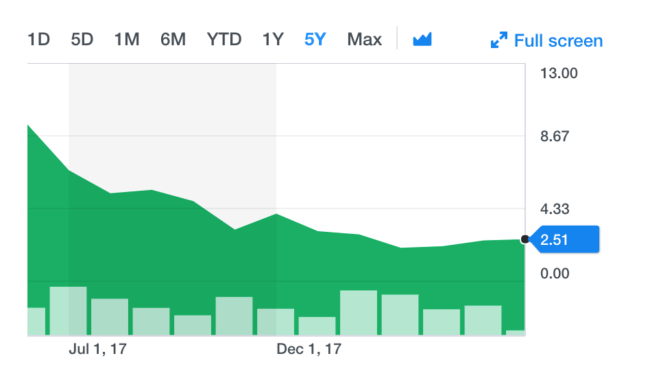
But if I asked you about this, would you say that buying Blue Apron was an expense or that it was simply a “bad investment”?
My guess is the second.
Investments are meant to grow, expenses are not.
The way to change the perception around SEO (or any form of digital marketing really) is to move the conversation in the direction of what our potential clients really care about.
They care about revenue, not rankings.
They care about a more profitable business and lower acquisition costs, not “more users”.
They may talk about “rankings” or “better Google backlinks” because that is the vocabulary they’ve been taught. They’ve been taught that SEO is backlinks and meta tags.
It’s up to us to change the conversation. Take them to their Analytics (assuming it is set up well and conversions by channel are being tracked well…) and show them that SEO (or whatever channel) is a channel that performs well for them, if it does. And if it doesn’t, then show them why not.
Instead of selling them links, sell them traffic that converts into paying users. Don’t sell them leads, sell them new clients. Don’t sell them better category page rankings, sell them revenue.
Sell your potential clients an investment into something that should grow like Facebook stock, assuming the right things are done.
SEO services are location-based now
Over the last few years, I have seen a shift in how the search engines rank terms like “SEO services” or “SEO agencies”. Take a look at these results for [seo services] which I searched for from my favorite coffee shop in Denver:
Same thing with [seo consultant]:
Unless you’re trying to get local clients, these terms are not going to serve you well anymore.
Forget “SEO services”
I put SEO services in quotes purposefully. I’ve been a professional SEO for almost a decade now and I still have no idea what people mean when they say they offer “SEO services”.
Maybe I’m too into the nuance for my own good, but as a business owner and an SEO I have to point everything back to revenue.
I won’t buy “development services” because they’re not solving a problem. But I’ll hire a WordPress membership site design and development agency when I need to redo my WordPress membership site.
I won’t buy “social media services” because I can operate social media. But I’ll hire a Facebook Ads consultant when I need to spin up new advertising campaigns and work over time to optimize them.
In order to survive in the changing world of digital marketing, you need to be a specialist.
Moving from generic > specialist
I get it. “SEO services” has better search volume than other terms:
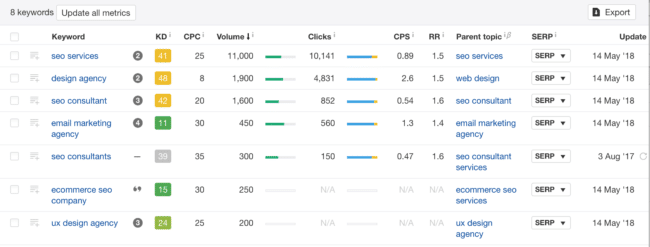
But as I showed you above, it probably doesn’t make strategic sense to try to rank here.
But a term like [enterprise seo consultant] may be worthwhile (logged in, location aware):
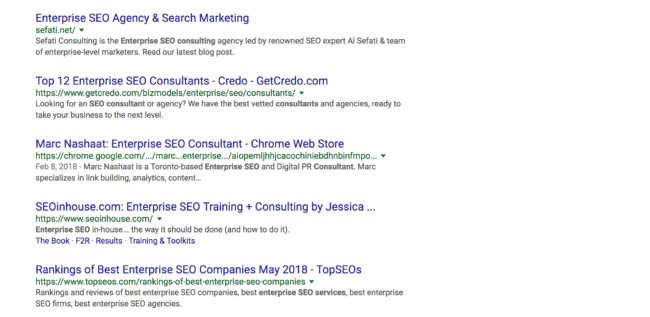
Same with [b2b seo company]:
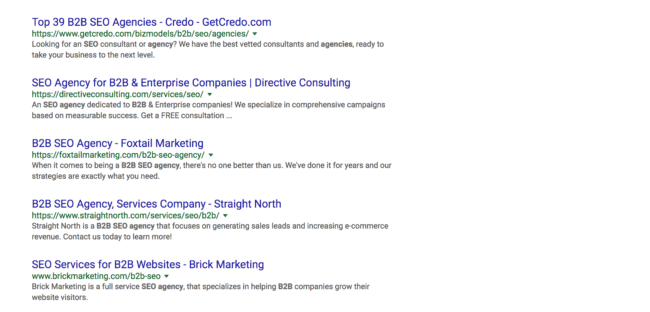
The incredible thing about these keywords is that even though they are lower volume than a term like [seo agency], they will actually build your business with better clients.
Don’t get me wrong, you will receive fewer leads by ranking well for [enterprise seo consultant] or [b2b seo agency] than if you rank for [seo services], but these leads will:
- be better qualified
- have bigger budgets
- be more likely to sign with you
Ranking for [seo services], if you could even do it these days, will get you a lot of volume but a lot of noise and uneducated potential clients. If you want to serve those clients, then great. Go for it. They’re all yours.
But if you want to generate good quality clients through organic means, you need to be specific about the keywords you are ranking for, message that well on your site, and ultimately speak to that client and the work you have done for clients like them.
So yeah, “SEO services” are dead.
But SEO is well and alive.

